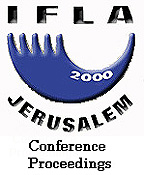 66th IFLA Council and General
Conference
Jerusalem, Israel, 13-18 August
Code Number: 171-140-E
Division Number: 0
Professional Group: CLM Open Forum
Joint Meeting with: -
Meeting Number: 140
Simultaneous Interpretation: Yes
WTO and libraries - an introduction
Frode Bakken
Library of Buskerud
Buskerud, Norway
Paper
We are gathered here to focus for a few hours at this IFLA meeting on the question of libraries and the World trade organisation - WTO.
This is a strange story - in the beginning my of you will not believe that this can be true.
Most of you maybe remember the WTO-meeting in Seattle in the end of november and the beginning of december 1999. There were big demonstrations and a halt in the conference. Some of you are maybe not aware that IFLA was officially accredited at the conference with Paul Whitney as our excellent representative. You will hear more about his mission later. IFLA is entering into the topic of global trade policy. There is a large development in the world forming a new framework for the world trade. And IFLA is there. As far as I know IFLA has never before been a lobbyist group and accredited NGO in a trade policy context even if we have a long tradition in attending WIPO conferences and also regional copyright conferences.
Very brifly we should make an outline of WTO.
The WTO headquarters is in Geneva - very close to the WIPO HQ. There are between 130 and 140 member states. The aim of WTO is to enhance world trade through liberalisation of world trade or as this is formulated by WTO itself:"the main function is to ensure that trade flows as smoothly, predictably and freely as possible." WTO is a follow-up of GATT - the General Agreement on Tariffs and Trade. Be very aware that GATT was the old General Agreement on Tariffs and Trade. GATT was later superseded by the World Trade Organization when WTO was established. GATS is new - General Agreement on Trade in Services - one of the sector agreements under the WTO umbrella.
While GATT was comprising only goods - physical goods, WTO comprises all kinds of trade activities in physical goods, services, investment rules and intellectual property. Different sector agreements have been established.
I will for a few minutes describe the process which led up to the IFLA-involvement in WTO. World trade has had an enormous expansion after world war II and during the last years the increase in trade in services has been very significant. In 1997 the global trade in services already represented approximately 25 % of trade in physical goods. It is expected that trade in services will expand extensively - especially as a result of the development of large rehional free-trade zones and the rapid development of information and communication technology.
It was our canadian colleagues in the British Columbia library association and later the Canadian library association who developed the library approach to these complicated processes and who informed the world library community about this. We are very grateful to them.
While WTO has a process which to some extent is open and transparent, OECD - the Organisation for economic development - the organisation for 29 of the richest countries in the world - was running a parallell process promoting the MAI-agreement. This was a closed and secret process untill the world became aware of it. This agreement which never became a reality, was meant to to promote foreign investments all over the world. It was expected that this would reduce in a dramatic way the role of the nation state and its legislation and increase the influence of the trans-national companies. The focus from the canadian librarians and later IFLA CLM came at a time - in 1997 and 1998 - when the world became aware of the realities of the MAI-proposals. The whole MAI-process collapsed in october 1998 when France withdrew their support of a continuous MAI-process in OECD.
IFLA established its Committee for copyright and other legal matters - CLM - in 1997/1998 and one of the sub-groups was the MAI-working group. When MAI was stopped in OECD, the working group was renamed the WTO working group. One of the main tasks was to monitor and asess issues and relevant developments concerning the WTO and its possible impact on library operations.
At the Bangkok meeting of IFLA in august 1999 the IFLA CLM-committee adopted the following text:
"It is recommended that IFLA act on behalf of interests of libraries by:
- actively encouraging members to lobby at national level to promote protections for libraries and culture in international trade agreements
- monitoring and participating, as appropriate, in the WTO "Millenium Round" of trade talks scheduled for Seattle, november 29-December 03, 1999
- considering to establish a publicly-accesible website with background and updated information on libraries and relevant international trade agreements."
This had the effect that IFLA applied for and got an official accreditation as NGO (Non-governmental organisation) at the WTO conference in Seattle.
IFLA adopted a position paper after a proposal from the WTO working group and the CLM-chair Marianne Scott. (All these documents can be found at the IFLA website on
http://archive.ifla.org/III/clm/copyr.htm.)
This represents a short introduction to the IFLA involvement in global trade policies and which so far has brought IFLA to Seattle. Now library director Paul Whitney will tell the exciting story about Seattle.
| 
